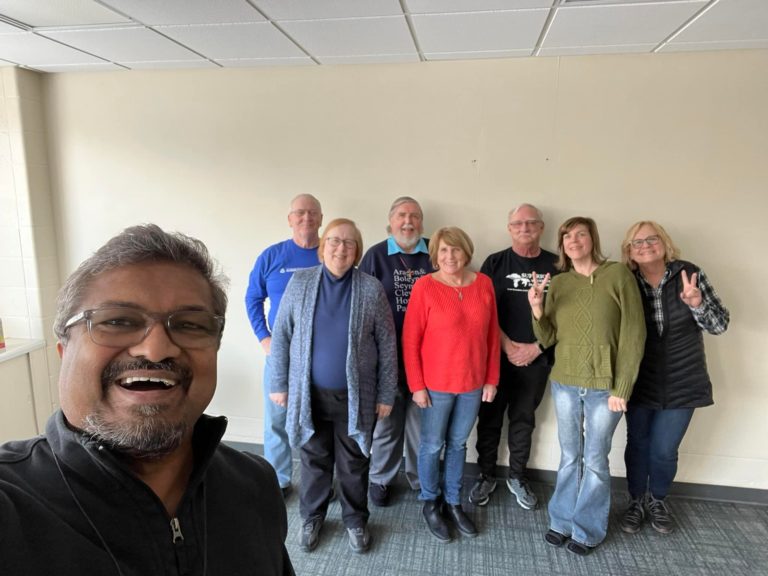Dear Friends,
We are thrilled to announce the hiring of four regional youth missioners to serve our two dioceses.
The intention is to develop additional on-the-ground support for our local congregations in the area of youth ministry appropriately contextualized to the area in which they serve. In this role, they are charged with communicating and collaborating with leaders and families to increase and empower local efforts with youth within and beyond the existing community. Their specific duties will be flexible, depending on the needs of the congregations in their region and may include resource sharing, congregational and/or regional events, volunteer recruitment, and more. Whether your community has a robust youth program or hasn’t for years, these youth missioners are here to support you.
The two dioceses have been broken down into four youth regions to encompass the area that these missioners will serve*. In all but one grouping, the youth regions include congregations and ministries from both dioceses. Click here to view the breakdown.
Our regional youth missioners will be in touch with their respective communities as soon as possible to learn more about your needs and dreams for youth ministry within and beyond your community.
Please join me in welcoming the people listed below to the role of Regional Youth Missioner. We are blessed to have such wonderful leaders serving among us.
 The Rev. Radha Kaminski (she/her) — Northern Youth Region
The Rev. Radha Kaminski (she/her) — Northern Youth Region
Radha joined the Diocese of Western Michigan as a Hope College student in 2008 after growing up in North Central Florida, spending time with the communities of Grace, Holland and St. John’s, Grand Haven, where she was the youth coordinator. She was ordained to the priesthood in January 2021 after receiving her M.Div. from Seminary of the Southwest in Austin, TX. She serves as the rector of the Central Michigan Episcopal Covenant (St. Andrew’s, Big Rapids and St. Mary’s, Cadillac). She lives in Cadillac with her husband, Matthew, their dog, Mara Joy, and two cats, Bob and Shirley. She enjoys knitting, board games, baking, and exploring the great outdoors.
The Northern Youth Region is composed of 34 congregations and organizations, including communities from both dioceses. Click here to view the regional break down.
 Jeff Brown (he/him) — Central Youth Region
Jeff Brown (he/him) — Central Youth Region
Jeff is the Director of Youth Ministries for Grand Rapids Episcopal Youth, a collaboration between St. Mark’s, St. Andrew’s, and Grace Episcopal Churches in Grand Rapids. Jeff is a known leader in youth ministry, having organized and led efforts such as the progressive mission trip for many years. Jeff also works as the Visual Display Coordinator for Gazelle Sports, is a certified yoga instructor, loves trail running, and is quite obsessed with Cedar Point. He and his wife, Angie, live in Grand Rapids with their two teenage sons.
The Central Youth Region is composed of 24 congregations and organizations, including communities from both dioceses. Click here to view the regional break down.
 Beckett Leclaire (they/them) — Eastern Youth Region
Beckett Leclaire (they/them) — Eastern Youth Region
Beckett serves as the Faciliator of Holy Hikes Great Lakes and is a nominee for Holy Orders in the Diocese of Eastern Michigan. They attended University of Mississippi, and graduated in 2019 from the Academy for Vocational Leadership, the local formation program of the Dioceses of Eastern and Western Michigan. They serve on the Building Bridges Steering Committee and the Bi-Diocesan Evangelism Task Force and are a member of Grace, Port Huron. Beckett lives in Port Huron with their spouse, Kay, their daughter, Audrey, and their cat, Razzle.
The Eastern Youth Region is composed of 25 congregations and organizations, including communities from both dioceses. Click here to view the regional break down.
 The Rev. Joel Turmo (he/him) — Southern Youth Region
The Rev. Joel Turmo (he/him) — Southern Youth Region
Joel has been the rector of St. Timothy’s, Richland since 2012. Prior to this he was the Director of Youth and Family Ministries at St. Gregory’s in Boca Raton, FL. Both in Florida and in Michigan, he’s served as a youth coordinator, co-leading many diocesan events including retreats and the progressive mission trip. He is passionate about including youth in all aspects of the church. Joel earned his M.Div. from Sewanee School of Theology in 2008. Joel and his college-aged sons live in Richland.
The Southern Youth Region is composed of 23 congregations and organizations, all geographically resident in EDWM. Click here to view the regional break down.
We are also happy to introduce Michelle Ruiz, who will serve both dioceses as Assistant for Communications, a quarter-time and remote position budgeted under the ministry of Evangelism and Networking.
 Michelle Ruiz (she/her) — Assistant of Communications
Michelle Ruiz (she/her) — Assistant of Communications
Michelle is a student at Grand Valley State University working toward a Bachelor’s Degree in Multimedia Journalism. She enjoys advocating for women’s rights and communities of color. In her free time, Michelle likes to unwind by painting and watching television shows. She especially loves the comedy genre and anything that will make her laugh.
In her role, Michelle, who is bilingual, will assist our dioceses in all functions of communications including our bi-diocesan newsletter, websites, social media, and our print magazine, The Feast. She may also assist in resourcing congregations, clergy, and lay leaders for improvement and integration of local communications efforts. This position had been vacant since November of last year.















 The Rev. Radha Kaminski (she/her) — Northern Youth Region
The Rev. Radha Kaminski (she/her) — Northern Youth Region Jeff Brown (he/him) — Central Youth Region
Jeff Brown (he/him) — Central Youth Region Beckett Leclaire (they/them) — Eastern Youth Region
Beckett Leclaire (they/them) — Eastern Youth Region The Rev. Joel Turmo (he/him) — Southern Youth Region
The Rev. Joel Turmo (he/him) — Southern Youth Region Michelle Ruiz (she/her) — Assistant of Communications
Michelle Ruiz (she/her) — Assistant of Communications 